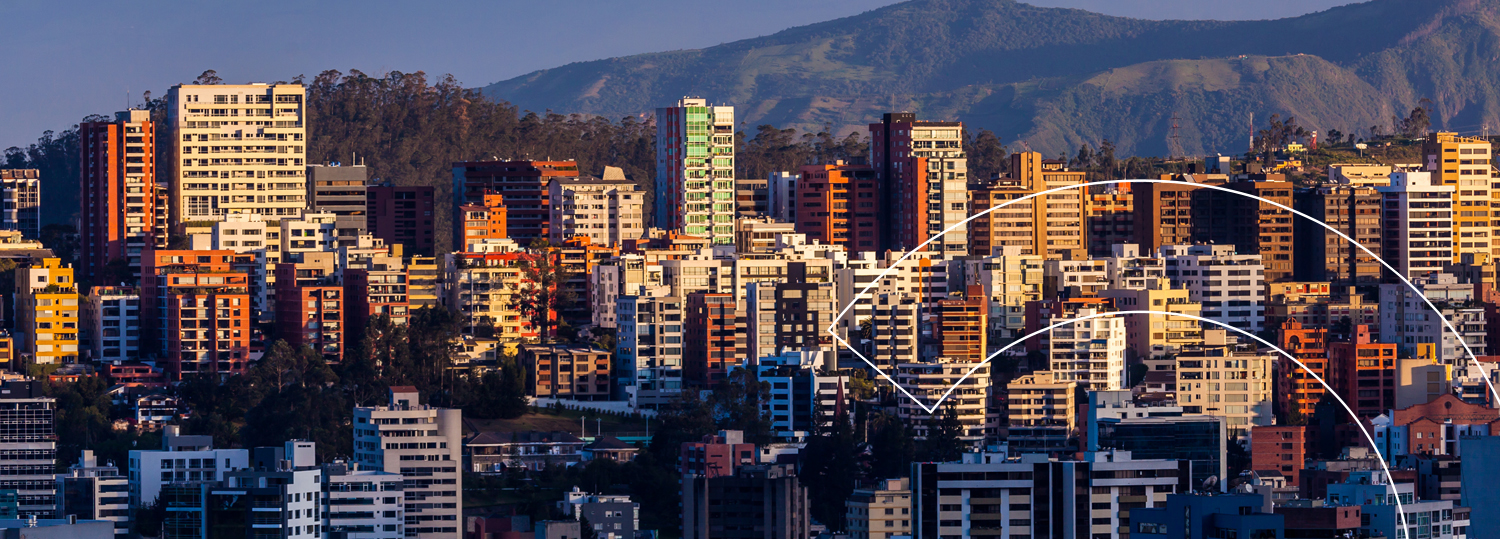This small country in Latin America, bordered by the Andes and the Pacific Ocean, combines unique characteristics that make it very attractive country for investors and business.
Ecuador has a rich cultural heritage and a warm people, and was ranked one of the 17 megadiverse countries of the world by Conservation International in 1998. It’s one of the most stable economies in Latin America, with clear policies and tax incentives, and trade agreements with key countries that allow merchants to access millions of consumers and drive business.
A brief overview of the country
Located at the north-west of South America, the country’s borders include continental and island territory, notably the famous Galapagos Islands. Ecuador’s official language is Spanish, and its capital is Quito, a city that has one of the best preserved historic centers of Latin America, designated World Heritage Site by UNESCO.
Quito is ranked 48th out of 200 in the Global Business Cities Index, has 1.8 million inhabitants, and it’s consider a safer city than the average for the Latin American region. Asides the capital, Ecuador main cities are Guayaquil and Manta, both in the Pacific coast, and Cuenca, another World Heritage Site.
Demographics
In 2018, the country registered 17,084,357 million inhabitants, an insignificant increase from the 16,785,361 million registered in 2017 that kept the population growth rate in 1.77%. But the forecasts are that by 2024 Ecuador’s total population will reach 18.52 million inhabitants. The population lives mainly in the cities and urban areas, although the urban population growth rate has been decreasing from 3.8% to 2% in the past two decades.
Economy
In 2000, Ecuador changed its currency Sucre to the US dollar as a way to mitigating the economic crisis in which the country was immersed. Since then, the country become economically stable, and its inflation rate has been decreasing, albeit a few ups and downs due to oil price fluctuations: 3.66% in 2014, -0.19% in 2017, 0.26% in 2018, -0.06% in 2019. *
* Note: The forecast for 2020 was 0.13%, but the Coronavirus outbreak will change for sure the IMF projections.
Ecuador has one of the 20 largest oil reserves in the world and is one of the OPEC’s members that contributes to its 79% share of the world crude oil reserves. So, Ecuador relies heavily on oil export revenue, and is very dependent on fossil fuel. However, exports are not limited to fossil fuels:

And despite the importance of oil crude in the Ecuadorian economy, the services sector makes up for the biggest share of the country’s GDP:


Approaching e-commerce in Ecuador
Ecuador is timidly joining e-commerce, although it has the sixth largest market share in the Latin American region with 2.3%, behind Colombia (4.7%) and Chile (4.4%).

It is curious as Ecuador has a higher penetration rate than the giants of the e-commerce market (Brazil and Mexico) and, however, has not yet stablished a culture of online shopping. But according to Cámara Ecuatoriana de Comercio Eletronico, Ecuador’s Chamber for E-commerce (CECE), things are changing – and e-commerce is gaining momentum thanks to mobile devices.
The Ecuadorian consumer: online shopping behavior
Indeed, the access to new technologies is playing a key role in the way Ecuadorian consumers relate to online shopping. Nevertheless, work must be done to break down barriers to online consumption:
- consumers prefer to see products before buying it
- consumers fear data breach
- consumers fear being deceived
- consumers mistrust payment methods
- consumers mistrust e-retailer’s product details
Source: Statista

When shopping online, the most popular items for Ecuadorians are cloths and accessories, shoes, electronics, travel tickets, and hotel booking:

As the numbers show, there’s a willingness to shop online among Ecuadorian consumers, and if one considers that the country’s population is young and the access to internet through smartphones and tablets is increasing, then it’s expected that e-commerce develops.
To fulfil its potential, altogether Ecuadorian e-commerce market players will have to focus on offering a good shopping experience and creating a trusting relationship with the consumer, including secure transactions and local alternative payment methods, as it’s happens in other LATAM markets.
Doing business in Ecuador? Partner with BoaCompra
In Ecuador, e-commerce still has a long way to go until it reaches the level of development that other Latin American countries have, but its market share in the LATAM region encourages investment. Therefore, whether you a local entrepreneur/company or an international merchant, it’s most relevant that you have a local expert on your side.
BoaCompra is a payment solution expert and provider with more than 15 years of expertise in helping companies grow and sustain their business, giving access to local payment methods. Get in touch with us to learn more:






